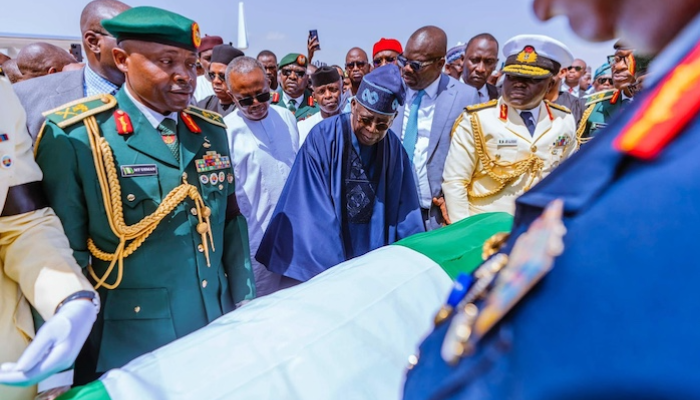
Muhammadu Buhari Laid to Rest in His Hometown Daura
Nigeria’s former President Muhammadu Buhari was laid to rest on Tuesday, July 15, 2025, in his native Daura in Katsina State, following his passing at the age of 82. The former military general and two-term civilian president died in a London hospital after an undisclosed illness.
Thousands of mourners gathered in Katsina and Daura to witness the burial, with some climbing trees for a final glimpse of the late leader’s casket—wrapped in Nigeria’s national green and white flag—as it was lowered into the ground at his private residence.
President Tinubu and Dignitaries Attend Funeral Ceremony
The funeral proceedings began with the arrival of Buhari’s body at the Katsina airport, where President Bola Ahmed Tinubu, top government officials, and religious leaders were present to receive the coffin. The solemn event featured a military parade and a 21-gun salute, honouring Buhari’s contributions to the nation both as a military ruler and a democratically elected president.
President Tinubu declared a seven-day national mourning period and announced a public holiday on Tuesday, reflecting the country’s official recognition of Buhari’s legacy.
The Rise, Fall, and Return of Buhari
Muhammadu Buhari first entered Nigeria’s political stage as a military ruler in the early 1980s, after leading a coup. His brief regime ended when he was overthrown in 1985. Decades later, in a historic democratic comeback, he was elected president in 2015, defeating then-incumbent Goodluck Jonathan—becoming one of the few military leaders in Africa to regain power through democratic means.
Buhari’s Legacy: Mixed Reactions to a Polarizing Leader
Buhari’s eight-year tenure from 2015 to 2023 was characterized by both praise and criticism:
Achievements & Support
- Maintained strong grassroots support in northern Nigeria, especially among Muslim communities
- Known for his austere personal lifestyle
- Advocated for a tough anti-corruption stance, which resonated with many ordinary Nigerians
- Promoted agricultural reforms and infrastructure investment in the northern states
Challenges & Controversies
- His presidency witnessed multiple economic downturns, with two major recessions
- Struggled with foreign currency shortages and a decline in oil production, affecting national revenue
- Widespread insecurity and insurgent attacks plagued the country, particularly in the northeast
- Critics argue that anti-corruption efforts yielded few high-profile convictions, raising concerns about selective justice
Despite these issues, Buhari remained a revered figure in parts of Nigeria, particularly in the north, where crowds chanted “Sai Baba”—a term of endearment—during his final journey home.
National Reflection: A Final Chapter in Nigerian Political History
As Nigerians reflect on the complex legacy of Muhammadu Buhari, his death marks the end of an era for a leader who straddled both military authoritarianism and democratic leadership. For many, his burial was not just the farewell to a former president—but to a figure who symbolized a generation of post-colonial African governance.

